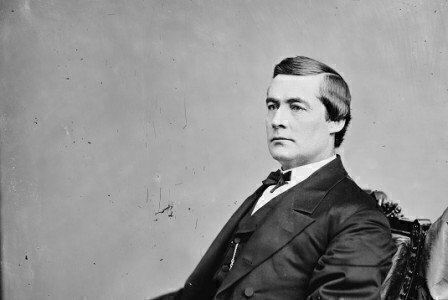After being impeached, President Andrew Johnson survived his 1868 Senate trial by just one vote. And to this day, how that vote was cast on May 16, 1868 remains shrouded in controversy.
Johnson ascended to the presidency in 1865, after Abraham Lincoln’s assassination. A former Democrat who ran as a candidate alongside Lincoln, President Johnson’s relationship with the Republican leadership quickly crumbled. A faction called the Radical Republicans, led by Thaddeus Stevens and Charles Sumner, dominated the party.
On February 24, 1868, President Johnson was impeached by the House of Representatives. The House charged Johnson with violating the Tenure of Office Act. The alleged violation stemmed from Johnson's decision to remove Secretary of War Edwin Stanton, a prominent Radical Republican leftover from the Lincoln Cabinet.
To block Johnson from removing Cabinet members without its approval, the House had passed the Tenure of Office Act in 1867. Johnson challenged the act by firing Stanton and appointing an interim replacement. The House quickly filed 11 impeachment charges, sending the case to the Senate for disposition.
Two-thirds of the Senate was needed to convict Johnson, and the Republicans made up more than two-thirds of its members. Chief Justice Salmon Chase presided over the trial, which started in March and ended in late May. Thaddeus Stevens was one of the House prosecutors.
In the end, however, seven Republican senators voted against impeachment. The dramatic scene would have fit right in with the movie Lincoln, with the outcome seemingly in doubt until the last undecided vote was cast.
“It is a singular fact that not one of the actors in that high scene was sure in his own mind how his one senator was going to vote, except, perhaps, himself,” said historian David Miller Dewitt.
The key day in the trial was May 16. The anti-Johnson forces were counting on a guilty vote on the 11th and last article of impeachment. It was the first order of business and a summary of the other 10 articles. If President Johnson was found guilty in the first vote, he was out of office.
Senator Edmund Ross of Kansas, a Republican, cast the deciding vote, and for all purposes, he was expected to vote against Johnson, up until the night before the final roll call.
The chamber was stunned when Ross said “Not guilty.” The Radical Republicans asked for an adjournment until May 26, in part because of an upcoming party convention, but also because they had no plan of attack after Johnson survived the first vote. On May 26, votes on two more articles failed, and the trial ended.
The controversy, to this day, is why did Ross change his mind?
There were two serious constitutional issues involved in the trial. One was that some people didn’t think the Tenure of Office Act was constitutional. The other was that the Constitution, at that point, didn’t specify who became vice president when the president died or couldn’t serve.
If Johnson had been impeached, the Senate president pro tempore, Benjamin Wade, would have assumed the duties of the office until the next election. Wade had his own enemies within the Republican Party, including Ross (who foresaw Wade taking away his patronage powers in Kansas if Wade became president).
One theory is that Ross didn’t follow his constitutional conscience—he followed the cash. Ross may have been the beneficiary of a $150,000 slush fund set up by Johnson’s supporters.
In a 1999 article for Slate, writer David Greenberg pointed out another fact: Ross’s vote may not have been needed.
“At least four other senators were prepared to oppose conviction had their votes been needed--a fact that has been forgotten, maybe, because it doesn't square with the High Noon portrait of Ross as the man of principle facing down the mob,” Greenberg said.
In later years, Ross was portrayed as a hero in John F. Kennedy’s book Profiles in Courage. Others, like historian David O. Stewart, paint a less flattering portrait of Ross when it comes to allegations of bribery and patronage spoils.
Ross lost re-election after the Senate trial and later switched to the Democratic Party. He blamed the Senate trial vote for hurting his political career.
Then in 1885, Grover Cleveland, who was the first Democratic president to take office since the Civil War, named Ross as the governor of the New Mexico Territory.








